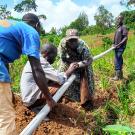Although the growing market for horticultural products in Uganda offers an opportunity for smallholder farmers to improve their income, the farmers' access to these markets is still limited. This project develops a participatory extension model to rapidly improve smallholder linkages to horticultural markets, by merging and supplementing two agricultural development models: farmer field schools (FFS) and the participatory market chain approach (PMCA).
The project team works with farmer groups established during a previous Horticulture Innovation Lab project in Nkokonjeru, Uganda. The team also evaluates the potential of the adapted FFS methodology to a pilot community in the Democratic Republic of Congo.
Specific objectives are to strengthen farmer groups’ capacity to produce indigenous leafy green vegetables and tomatoes for the market and improve farmers’ ability to use their farm as an income generating asset. Research in small plots and on farmers’ fields of economically appropriate soil fertility management technologies, including micro-dosing, improved varieties, irrigation, and safe pesticide use, identifies ways to increase vegetable yields and quality. Curriculum enhancement with a local university (Uganda Christian Univesity) and Uganda’s primary agricultural university (Makerere University), as well as with governmental and NGO agricultural extension, strengthens the region’s capacity to carry out and sustain research and extension activities for horticultural crops.

